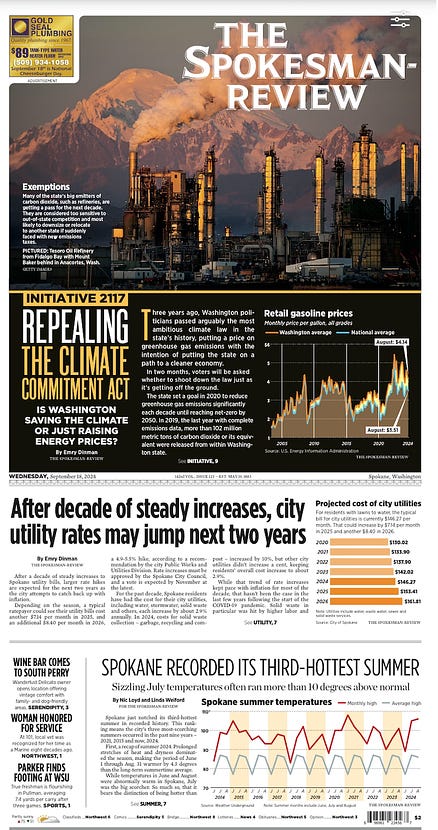The only Republican good is personal and corporate profit
The bottom line to this post is simple: Vote “no” on every Washington State “Initiative” that appears on your ballot in November if you value the common good. (N.B. Some local jurisdictions have some “Propositions” or “Measures” that deserve a “yes” vote—don’t confuse those with the “Initiatives”—all four of which should be packed together and labelled as the “Republican Greed Initiatives.”)
Washington voters will see these four statewide initiatives on the November ballot. All four are spear-headed and financed by Brian Heywood, a wealthy venture capitalist transplant from California, and Jim Walsh, the chairman of the Washington State Republican Party and a current west side representative to the Washington State legislature. The intent of all four initiatives is to convince you, as a resident of Washington State, that you should reject what a majority of our elected representatives have made state law in the interest of the common good of the people of Washington.
The measures contained in this suite of Republican greed initiatives are numbered I-2109, I-2117, I-2124, and I-2066. (To access the Voter Guide detail, see P.S. below.)
The Cardinal Greed Initiative, I-2109
I-2109 would repeal the relatively new Washington State capital gains excise tax. The capital gains excise tax provides significant funding for K-12 education, higher education, school construction, early learning, and childcare. Why, pray tell, might Mr. Heywood be interested in repealing the capital gains excise tax? Simply put, greed. Mr. Heywood moved to Washington State from California, in his own words, “to make money.” Obviously, he is willing to go to great lengths and expense to fund and promote initiatives in order to keep every bit of that money from supporting the public schools. This despite the fact that these are Washington public schools, educating the workforce on which Heywood’s ever expanding wealth depends.
Worried about tax on the capital gains from the sale of your home or your farm?They’re exempt—as are a host of other capital gains, like those from the sale of livestock, timber, or stocks in your Individual Retirement Account (IRA). So what capital gains are taxed? We might characterize them as “abstract capital gains,” primarily capital gains made on the sale of stocks and bonds or other financial instruments, just exactly the sort of transactions and manipulations that grow even more wealth for people who are already wealthy. Most importantly no such capital gains are subject to the excise tax until they exceed $250,000. Can you even imagine that sort of gain reported on your Form 1040? (Note also that the exemption is indexed to inflation.) None of those limiting facts about the application of the excise tax are widely advertised or known, a convenience for those like Mr. Heywood who would rather you focus only on the word “tax” and worry that your own meager nest egg might be threatened. Republican chairman Walsh (no doubt with Heywood’s backing) even tried legal maneuvering to keep any mention of the loss of school funding if the excise tax is repealed off the ballot. (See extended coverage and references in “Washington State Republicans Want To Keep You in the Dark.”)
The Climate-Trashing Heywood/Walsh Initiatives
Two of the remaining three initiatives, I-2117 and I-2066, would repeal good faith efforts to address the devastating effects of global heating. With wildfires, sequential summers of record heat, and “thousand year” storms with record tide surges, rainfall, and flooding like that of Hurricane Helene that cropping up routinely, getting on board to minimize further global heating is the paramount example of the common good. With the leader of the entire Republican Party declaring that “climate change is a hoax” and vowing that “on day one” he will “drill, baby, drill” it is time to heap ridicule on any Republican who claims to “believe in climate change,” while they proceed to advocate dismantling, or, worse, prohibiting by initiative good faith efforts to address the long term threat.
I-2066, is a particularly bald-faced attempt to protect the fossil gas industry by baselessly ginning up angst and loathing by pretending that government and/or government agencies are about to tell existing fossil gas customers that they have to scrap their gas appliances. Alarmist BS. Stop for a second and consider what a political suicide move that would be. Yes, it is sensible to curtail expansion of gas distribution infrastructure—and would, in a long term, save us all money in installation and maintenance costs. Expansion of fossil gas piping would only insure ongoing demand for fossil gas, when we need to gradually phase out burning fossil fuels. After all, the first rule of holes is that when you find yourself in one you ought to stop digging. (Aside: Think of those coveted, short-lived, pricey to burn—and hot—incandescent lightbulbs we hardly ever see anymore?) I-2066 wouldn’t just prohibit limits on new fossil gas infrastructure; it would “require certain utilities and local governments to provide natural [fossil] gas to eligible customers.” I-2066 could hardly be more coercive in favor of perpetuating the climate risks of the burning of fossil gas.
I-2117 would dismantle Washington State’s cap-and-trade system that has just gotten off the ground. Why? Let’s roll around in the dirt and argue about how much cap-and-trade might (but might not) be adding to the cost of fuel—and by all means don’t consider the benefits of decreasing our dependence on fossil fuels or the long term costs, both monetary and human, of notaddressing the issue of global heating. Like the other global-heating-promotion initiative, I-2117 would also preemptively prohibit any similar future state efforts of similar type.
Reject both of these fossil fuel industry-funded, global-heating-denying initiatives.
Finally, I-2124, that would make long term care insurance financially impracticable
Anyone facing the need for long term care for themselves, an elderly parent, or some other family member knows how expensive and hard-to-come-by it is. Think of state-required purchase of long term care insurance as something akin to an add-on to Social Security. Like Social Security (which Republicans have wanted to dismantle since it was enacted nationally in the 1930s) long term care insurance, like all insurance programs, depends on pooled investment and the spreading of risk across participants some of whom will need it eventually and some of whom, unpredictably, never will. By changing participation in the insurance pool from mandatory to elective, I-2124, if passed, would doom long term care insurance to financial collapse—the final Republican blow to the efforts to bolster the common good.
Keep to the high ground,
Jerry
P.S. You can already read the WA State Voter Guide concerning these statewide initiatives by visiting vote.wa.gov, entering your voter registration name and your birthdate, clicking “Your Ballot and Voting Materials,” and, on that page, clicking “Voter Guide: What’s on Your Ballot?” (While you’re there, be sure to also click “Your Voter Registration” to confirm that your “Home Address” (the registered address that determines what will appear on your ballot) and your “Mailing Address” (to which the ballot will be sent in the next election) are both accurate, and that your registration is “Active”.

Brian Heywood and Jim Walsh. Would you buy a used car from either of these men?
